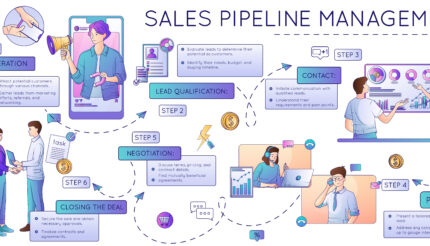Power of continuous leads generation: Building a successful business
Power of continuous leads; In the ever-evolving landscape of business, one principle remains steadfast: the importance of continuous lead generation. Regardless of your industry or niche, generating a steady stream of potential customers is the lifeblood of any successful business. In this article, we will explore why continuous lead generation is not just important but essential for building and sustaining a thriving enterprise.
Ensures a Consistent Flow of Opportunities
Continuous lead generation ensures a consistent influx of potential customers into your sales pipeline. Relying solely on existing clients or sporadic marketing efforts is a risky strategy. Markets change, consumer preferences evolve, and competition is fierce. By consistently generating leads, you insulate your business from the fluctuations and uncertainties that can derail even the most promising enterprises.
Fosters Growth and Scalability
To scale a business effectively, you need a scalable source of potential customers. Lead generation systems can be optimised and expanded to match your growth ambitions. Whether you’re a startup aiming for rapid expansion or a small business seeking steady growth, continuous lead generation adapts to your needs. As your lead generation efforts become more efficient, your business can grow without being constrained by a lack of potential customers.
Maximises Revenue Opportunities
More leads mean more opportunities to convert prospects into paying customers. It’s a simple equation: the more potential clients you engage with, the higher your chances of closing deals. Continuous lead generation allows you to cast a wider net, identify and nurture prospects, and ultimately increase your revenue. Even if only a fraction of your leads convert, the cumulative effect on your bottom line can be substantial.
Enhances Adaptability and Market Insights
Generating leads isn’t just about quantity; it’s also about quality. Continuous lead generation strategies provide valuable insights into market trends, customer behaviour, and evolving preferences. By consistently engaging with potential customers, you gain a deeper understanding of your target audience. This knowledge can be leveraged to refine your product offerings, messaging, and overall business strategy, ensuring your business remains relevant and adaptable in a dynamic marketplace.
Builds a Robust Sales Funnel
A well-structured sales funnel is a critical component of any successful business. Continuous lead generation feeds this funnel, allowing you to guide potential customers through various stages of the buying journey. From awareness and interest to consideration and conversion, a steady flow of leads ensures that your sales funnel is well-fed and efficient. This, in turn, leads to higher conversion rates and increased customer retention.
Mitigates Market Risks
Market uncertainties and unforeseen challenges can disrupt even the most stable businesses. Continuous lead generation serves as a buffer against such risks. When you have a healthy pipeline of leads, your business is better prepared to weather economic downturns, industry disruptions, or unexpected crises. Diversifying your lead sources can also reduce reliance on any single channel, making your business more resilient.
What are the reasons business owners don’t put more effort and resource into lead generation?
Power of continuous leads; Whilst lead generation is crucial for the growth and success of a business, there are several reasons why some business owners may not put as much effort and resources into it as they should:
Lack of Awareness:
Some business owners may not fully understand the importance of lead generation or may underestimate its impact on their business. They might not be aware of the potential benefits and long-term advantages it can provide.
Short-Term Focus:
Businesses often face pressure to deliver short-term results, such as meeting immediate revenue targets or managing day-to-day operations. This short-term focus can lead to neglecting longer-term strategies like lead generation, which may not show immediate returns but are essential for sustained growth.
Resource Constraints:
Many businesses, especially startups and small enterprises, operate with limited resources, both in terms of finances and manpower. Allocating resources to lead generation initiatives can be challenging when there are pressing operational needs and overhead costs to cover.
Fear of Failure:
Some business owners may be hesitant to invest in lead generation efforts due to a fear of failure. They may worry that their marketing campaigns won’t yield results or that they’ll waste resources on unsuccessful strategies.
Lack of Expertise:
Effective lead generation often requires a certain level of expertise in marketing, sales, and technology. Business owners who lack these skills or don’t have access to skilled personnel may struggle to implement successful lead generation strategies.
Misalignment of Priorities:
Business owners may have different priorities or may not see lead generation as a top priority compared to other aspects of their business, such as product development, customer service, or cost-cutting measures.
Inconsistent Efforts:
Some business owners may initiate lead generation efforts but then become inconsistent in their approach. They may not allocate sufficient time and effort to maintain and optimise these efforts over the long term, leading to suboptimal results.
Overreliance on Word-of-Mouth or Referrals:
Some businesses may rely heavily on word-of-mouth marketing or referrals from existing customers. While these methods can be effective, they often limit the growth potential of a business, as they are not scalable in the same way that systematic lead generation efforts are.
Perceived High Costs:
Lead generation can require investments in marketing tools, advertising, content creation, and personnel. Business owners may perceive these costs as prohibitive, especially if they are operating on a tight budget.
Competitive Ignorance:
Some business owners may underestimate the level of competition in their industry or market. They may not realise that their competitors are actively engaging in lead generation efforts and capturing potential customers.
Conclusion
Power of continuous leads: In the dynamic world of business, the importance of continuous lead generation cannot be overstated. It is the cornerstone of building a successful and sustainable enterprise. From ensuring a consistent flow of opportunities and fostering growth to maximising revenue and enhancing adaptability, the benefits of continuous lead generation are numerous.
Incorporating lead generation into your business strategy isn’t a one-time effort; it’s an ongoing process that requires dedication, creativity, and adaptability. By committing to continuous lead generation, you position your business for long-term success and create a solid foundation upon which to build and grow. In a competitive landscape, those who consistently generate leads are the ones who thrive, evolve, and prosper.
However, whilst lead generation is vital for business success, various factors, including limited resources, misconceptions, and competing priorities, can deter business owners from putting more effort and resources into it. Nevertheless, recognising the long-term benefits of effective lead generation and finding ways to overcome these obstacles can lead to sustainable growth and increased profitability.





